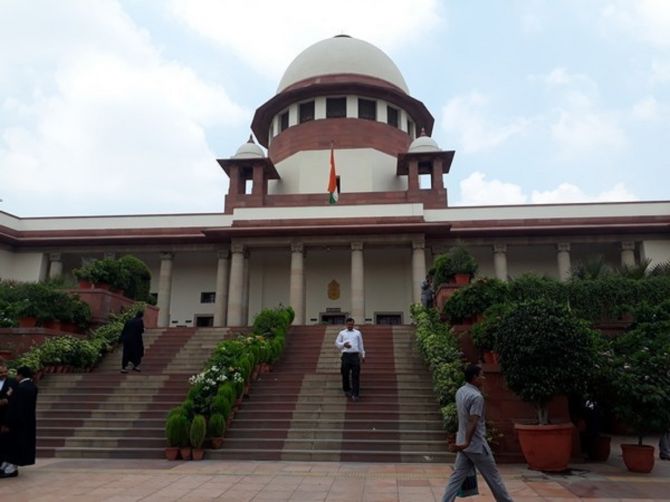The Supreme Court on Monday ordered the release of a man, who was awarded the death penalty for killing five women and two children in Pune in 1994, after it found that he was a juvenile when the offence was committed.

A bench of Justices KM Joseph, Aniruddha Bose and Hrishikesh Roy said that the court is accepting the report of the Inquiring Judge, who had inquired into the claim of juvenility of convict Narayan Chetanram Chaudhary.
"We declare that the date of birth of the applicant as reflected in the certificate issued by the Rajkiya Adarsh Uccha Madhyamik Vidyalaya of district Bikaner dated January 30, 2019...as '12', is to be accepted for determining his age at the time of commission of the offence of which he has been convicted," it said.
The bench said that going by that certificate, his age at the time of commission of offence was 12 years and 6 months and "thus, he was a child/juvenile on the date of commission of offence for which he has been convicted, in terms of the provisions of the 2015 (Juvenile Justice (Care and Protection of Children) Act. This shall be deemed to be the true age of Niranaram, who was tried and convicted as Narayan".
It said that since he has already served more than three years of incarceration and under the law as it prevailed at the time of commission of offence as also under the 2015 Act, he cannot be subjected to capital punishment.
"In view of this finding, the order sentencing him to death passed by the Additional Sessions Judge, Pune, and subsequently confirmed by the High Court and by this Court would stand invalidated by operation of law. He shall be set free forthwith from the correctional home in which he remains imprisoned, as he has suffered imprisonment for more than 28 years, having regard to the provisions of Section 18 of the 2015 Act," the top court said.
The bench said that the court agrees with the observations in its earlier verdicts that a casual or cavalier approach should not be taken in determining the age of the accused or convict on his plea of juvenility, but a decision against determination of juvenility ought not to be taken solely for the reason that offence involved is heinous or grave.
"The degree or dimension of the offence ought not to direct approach of the Court in its inquiry into juvenility of an accused (in this case a convict)," the bench said.
It added that once the applicant has discharged his onus, in support of his claim of juvenility by producing the date of birth certificate from the school, the State had to come up with any compelling contradictory evidence to show that the recordal of his date of birth in the admission register was false.
"The State, in this case, has not come up with any such compelling evidence which would render such certificate to be unreliable or false. The State and the complainant have sought to disprove the applicant's case on the basis of materials disclosed by him only, apart from the electoral roll," the bench said.
It said that the court cannot indulge in any guesswork to doubt the entry in the school register and no evidence has been led to contradict the basis of the age of the applicant reflected in the aforesaid document.
"The certificate of date of birth as evidence of age having been provided in the statute itself, we shall go by that. The other factor which has crossed our mind is as to whether a boy of 12 years could commit such a gruesome crime. But though this factor shocks us, we cannot apply speculation of this nature to cloud our adjudication process. We possess no knowledge of child psychology or criminology to take into account this factor while examining the report of the Inquiring Judge. Moreover, the age of the applicant revealed in the ossification test keeps the age of the applicant as claimed by him, within the range specified in the report," the bench said.
It said that the said ossification test was conducted in 2005, and his age was determined in the range of 22 to 40 years.
"If we take 22 years as his age in 2005, then his year of birth would haven been 1983. That would broadly correspond to the date of birth contained in the admission register," it said.
The apex court had on January 29, 2019, referred the application of Chaudhary raising the claim of juvenility to the Principal District and Sessions Judge, Pune, to decide the juvenility under provisions of Juvenile Justice (Care and Protection of Children) Act.
The top court had directed the district judge, Pune to submit the report within six weeks.
The case, which has traversed up and down the ladder of judiciary for more than two decades, was re-opened after a Constitution bench in 2014 held that review of death penalty cases will be heard in open court by not less than three-judges.
On August 24, 1994, five women, including a pregnant woman, and two kids aged below three years were killed in a flat in Kothrud, a sub-urban town of Pune.
Three persons were arrested on September 5, 1994, for the gruesome crime and were charged under various sections of IPC.
One of the persons arrested later turned an approver in the case and based on his testimony apart from other evidences, two of them were convicted and sentenced to death on February 19, 1998, by the Pune court.
On July 22, 1999, the Bombay high court upheld the trial court order and confirmed the death sentence.
The apex court dismissed the appeals of the two convicts in the case and upheld the death sentence on September 5, 2000. The top court also dismissed the review petitions on November 24, 2000.
In August 2015, the then President Pranab Mukherjee rejected the mercy petitions of both the convicts, including Chaudhary.
Chaudhary moved the apex court in 2016, seeking re-opening of his review petition.
In 2018, he moved an application claiming that he was a juvenile at the time of commission of offence and cannot be awarded death sentence.










